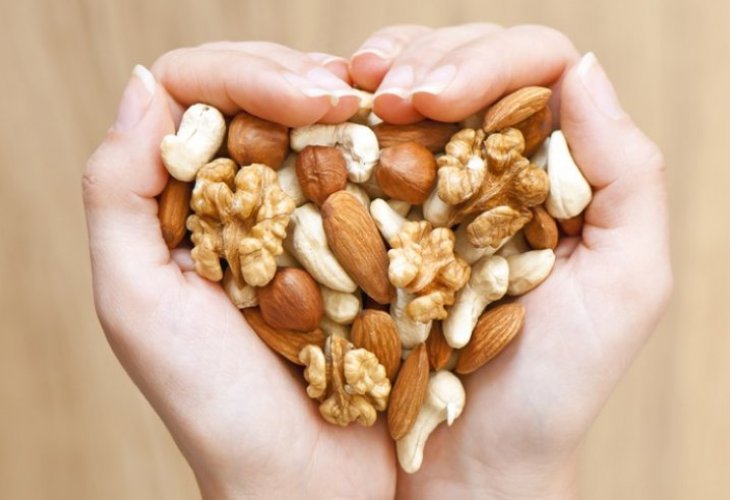Health and Mind
Nuts, Almonds, and Seeds: Essential Health Information
Discover the powerful health benefits of different nuts and seeds and how much to eat for optimal balance
 (Photo: shutterstock)
(Photo: shutterstock)What vitamins can be found in different types of nuts? Why should you not consume more than 2 Brazil nuts a day? Discover all the benefits of nuts, almonds, and seeds.
Walnuts
If you look closely, the shape of a walnut looks like a tiny brain. When it's halved and still inside the shell, it even resembles a heart. And that’s not just a cute coincidence because walnuts are truly good for both the brain and heart. They are packed with omega-3 fatty acids, which are essential for brain health, memory, heart strength, and a strong immune system. Omega-3s also help reduce inflammation, lower cholesterol, and may even support healthy weight loss.
Recommended daily amount: 3 whole walnuts
Cashews
Cashews are rich in key minerals like zinc, magnesium, iron, and potassium. They’re especially helpful for people dealing with high blood pressure. It’s best to eat them lightly roasted at home for the greatest benefit.
Recommended daily amount: 8–10 cashews
Pecans
These delicious nuts are filled with potassium, boron, manganese, and omega-3, nutrients that support bone health. They also provide vitamins B, C, and A, and contain high-quality plant protein. Pecans are great for heart and joint health and can help manage type 2 diabetes.
Recommended daily amount: 5 whole pecans
Pistachios
It’s best to eat pistachios unsalted and roasted in your own oven. They are especially good for heart health and for lowering the levels of fat in the blood. They also make a colorful and nutritious topping for salads.
Recommended daily amount: 10 pistachios
Hazelnuts
Hazelnuts are full of copper, iron, calcium, manganese, and vitamin E. They help fight off damaging free radicals, relieve stress, support healthy eyes and heart, nourish the brain, and may even slow the onset of dementia, including Alzheimer’s.
Recommended daily amount: 6–8 hazelnuts
Brazil Nuts
These large, oval-shaped nuts are less familiar to many people, but they are truly powerful. Brazil nuts are considered a “superfood” because they contain selenium which is a mineral that helps prevent cancer and heart disease. Selenium also supports the immune system and keeps the thyroid gland in balance. But caution is needed: too much selenium can actually harm your body and upset your digestion.
Recommended daily amount: Only 2 Brazil nuts per day
Almonds
Almonds are packed with calcium, iron, vitamin E, magnesium, potassium, and excellent plant-based protein. They help lower cholesterol, protect the heart, and reduce the risk of heart disease. Interestingly, the skin of bitter almonds contains a natural compound called cyanidin, which may help destroy cancer cells while sparing healthy ones. Almonds also reduce hunger, making them a helpful tool for healthy weight loss.
Recommended daily amount: 8–12 almonds
Pumpkin Seeds
Pumpkin seeds are especially high in zinc, a mineral that supports prostate health and boosts the immune system. Zinc also helps heal damaged tissues in the digestive tract, improves skin health, and supports fertility, especially in men.
Recommended daily amount: 1–2 tablespoons of shelled pumpkin seeds
Sunflower Seeds
These seeds offer zinc, omega-6 fatty acids, iron, calcium, and vitamin E. They can even help soothe a cough. For children, it’s best to grind the seeds before giving them.
Recommended daily amount: 1–2 tablespoons
Sesame Seeds
Sesame seeds are rich in calcium, iron, and fiber. However, they need to be ground before eating otherwise, the body can’t absorb their nutrients. One easy way to eat sesame seeds is by making raw tahini (techinah): blend sesame paste with water, lemon juice, and a little salt.
Recommended daily amount: 1 tablespoon of raw tahini
Coconut
Coconut is actually a type of nut, and it brings many health benefits. It contains lauric acid (also found in mother’s milk) which helps strengthen the immune system. It also contains caprylic acid, which helps fight harmful bacteria, viruses, and fungi. Coconut oil includes medium-chain fatty acids that give energy to the body without being stored as fat.
Recommended daily amount: 2 tablespoons of cold-pressed coconut oil

